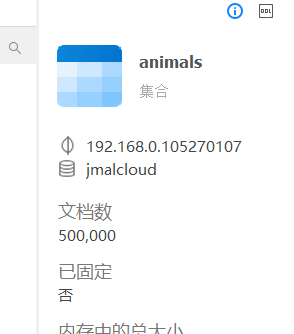mongo批量更新的几种方法
50w数据做测试

看一下mongo支持批量更新的几种PAI
1.0 public UpdateResult updateMulti(Query query, UpdateDefinition update, Class<?> entityClass) 2.0public UpdateResult updateMulti(Query query, UpdateDefinition update, String collectionName) 3.0public UpdateResult updateMulti(Query query, UpdateDefinition update, Class<?> entityClass, String collectionName) 4.0
给字段phone加上了唯一索引
/**
* 电话
*/
@Indexed(unique = true)
private String phone;
* 电话
*/
@Indexed(unique = true)
private String phone;

具体写法一:
1.查询集合内所有的数据
Query query0 = new Query();
query0.fields().include("phone");
long l0 = System.currentTimeMillis();
List<User> users1 = mongoTemplate.find(query0, User.class, "animals");
List<String> collect = users1.stream().map(User::getPhone).collect(Collectors.toList());
long l1 = System.currentTimeMillis();
System.out.println(">>>>>>>>>>>:"+(l1-l0));
2.更新参数
Update update=new Update();
update.set("sex","未知");
update.set("email","898989@qq.com");
update.set("work","焊武大帝");
UpdateOptions updateOptions=new UpdateOptions();
updateOptions.upsert(false);
Query query = new Query();
Criteria criteria=new Criteria();
criteria.and("phone").in(collect);
query.addCriteria(criteria);
3.具体更新
long l2= System.currentTimeMillis();
mongoTemplate.updateMulti(query, update, User.class,"animals");
long l3= System.currentTimeMillis();
System.out.println(">>>>>>>>>>>>>>>:"+(l3-l2));
4.结果
>>>>>>>>>>>:2379(查询整个集合一个字段出来在2.5s以内)
>>>>>>>>>>>>>>>:7629(更新50w控制在8s以内)
总计在12s以内,还可以接受
具体写法二:
1.0查询: Query query0 = new Query();
query0.fields().include("phone");
long l0 = System.currentTimeMillis();
List<User> users1 = mongoTemplate.find(query0, User.class, "animals");
List<String> collect =users1.stream().map(User::getPhone).collect(Collectors.toList());
long l1 = System.currentTimeMillis();
System.out.println(">>>>>>>>>>>:"+(l1-l0));
Update update=new Update();
update.set("sex","未知0");
update.set("email","8989809@qq.com");
update.set("work","焊武大帝0");
UpdateOptions updateOptions=new UpdateOptions();
2.更新参数: updateOptions.upsert(false);
Query query = new Query();
Criteria criteria=new Criteria();
criteria.and("phone").in(collect);
query.addCriteria(criteria);
long l2= System.currentTimeMillis();
3.0具体执行: BulkOperations bulkOps = mongoTemplate.bulkOps(BulkOperations.BulkMode.UNORDERED, "animals");
bulkOps.updateMulti(query, update);
bulkOps.execute();
long l3= System.currentTimeMillis();
System.out.println(">>>>>>>>>>>>>>>:"+(l3-l2));
4.0执行结果
>>>>>>>>>>>:2408(查询组织参数)
>>>>>>>>>>>>>>>:7769(50w执行)
具体写法三:(如果phone不加索引,会非常非常慢)
1.0 List<Pair<Query, Update>> updates=new ArrayList<>();
collect.stream().forEach(ele->{
Query query1 = new Query();
query1.addCriteria(new Criteria().and("phone").is(ele));
Update update0=new Update();
update0.set("sex","未知");
update0.set("email","898989@qq.com");
update0.set("work","焊武大帝");
Pair<Query, Update> of = Pair.of(query1, update0);
updates.add(of);
});
BulkOperations bulkOps = mongoTemplate.bulkOps(BulkOperations.BulkMode.UNORDERED, "animals");
bulkOps.updateMulti(updates);
bulkOps.execute();
long l3= System.currentTimeMillis();
System.out.println(">>>>>>>>>>>>>>>:"+(l3-l2));
2.0结果
>>>>>>>>>>>:2434(查询50w)
>>>>>>>>>>>>>>>:32490(执行50w,比上次时间高出了4倍!)
描述: 方法一和方法二结果基本一致,这两个都是基本的更新某个或者某几个字段 方法三除了多了一次50w的循环, List<Pair<Query, Update>> updates=new ArrayList<>();里面会在mongo内部执行50w操作,所以耗时比较严重。
<<<<<<<<<<<<<<<<<<<<<<<<<<<<<华丽分割线>>>>>>>>>>>>>>>>>>>>>>>>>>>>>>>>>>>
上述整体不变,改变个计划
query0.fields().include("phone");
把所有字段都查询出来,比较耗时。
>>>>>>>>>>>:6634(查询处理慢了3倍不到)
>>>>>>>>>>>>>>>:7890(执行时间相对于方法一和方法二整体时间没差别)
一点点学习,一丝丝进步。不懈怠,才不会被时代淘汰




